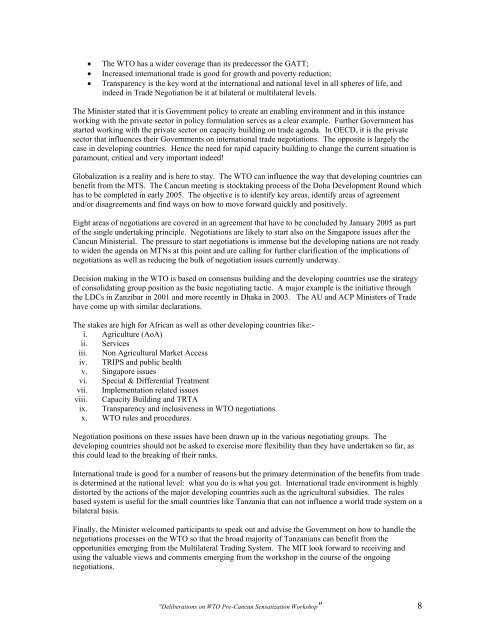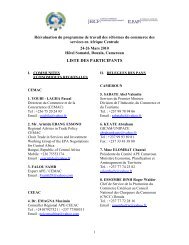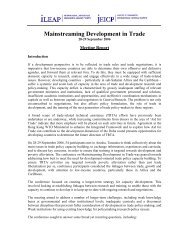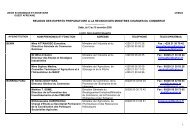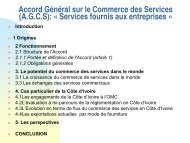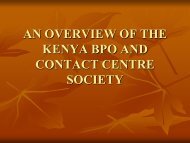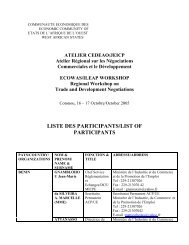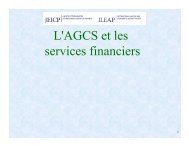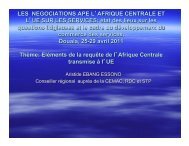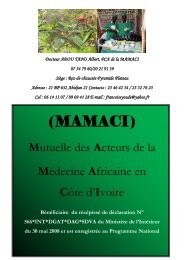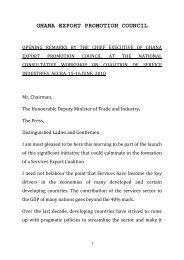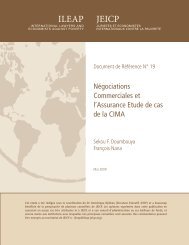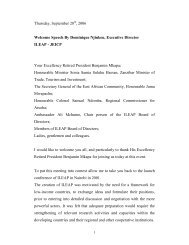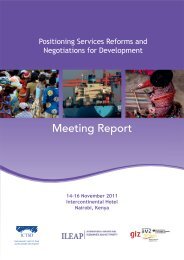Tanzania Report, Dar-Es-Salaam, Tanzania - ILEAP
Tanzania Report, Dar-Es-Salaam, Tanzania - ILEAP
Tanzania Report, Dar-Es-Salaam, Tanzania - ILEAP
Create successful ePaper yourself
Turn your PDF publications into a flip-book with our unique Google optimized e-Paper software.
• The WTO has a wider coverage than its predecessor the GATT;• Increased international trade is good for growth and poverty reduction;• Transparency is the key word at the international and national level in all spheres of life, andindeed in Trade Negotiation be it at bilateral or multilateral levels.The Minister stated that it is Government policy to create an enabling environment and in this instanceworking with the private sector in policy formulation serves as a clear example. Further Government hasstarted working with the private sector on capacity building on trade agenda. In OECD, it is the privatesector that influences their Governments on international trade negotiations. The opposite is largely thecase in developing countries. Hence the need for rapid capacity building to change the current situation isparamount, critical and very important indeed!Globalization is a reality and is here to stay. The WTO can influence the way that developing countries canbenefit from the MTS. The Cancun meeting is stocktaking process of the Doha Development Round whichhas to be completed in early 2005. The objective is to identify key areas, identify areas of agreementand/or disagreements and find ways on how to move forward quickly and positively.Eight areas of negotiations are covered in an agreement that have to be concluded by January 2005 as partof the single undertaking principle. Negotiations are likely to start also on the Singapore issues after theCancun Ministerial. The pressure to start negotiations is immense but the developing nations are not readyto widen the agenda on MTNs at this point and are calling for further clarification of the implications ofnegotiations as well as reducing the bulk of negotiation issues currently underway.Decision making in the WTO is based on consensus building and the developing countries use the strategyof consolidating group position as the basic negotiating tactic. A major example is the initiative throughthe LDCs in Zanzibar in 2001 and more recently in Dhaka in 2003. The AU and ACP Ministers of Tradehave come up with similar declarations.The stakes are high for African as well as other developing countries like:-i. Agriculture (AoA)ii. Servicesiii. Non Agricultural Market Accessiv. TRIPS and public healthv. Singapore issuesvi. Special & Differential Treatmentvii. Implementation related issuesviii. Capacity Building and TRTAix. Transparency and inclusiveness in WTO negotiationsx. WTO rules and procedures.Negotiation positions on these issues have been drawn up in the various negotiating groups. Thedeveloping countries should not be asked to exercise more flexibility than they have undertaken so far, asthis could lead to the breaking of their ranks.International trade is good for a number of reasons but the primary determination of the benefits from tradeis determined at the national level: what you do is what you get. International trade environment is highlydistorted by the actions of the major developing countries such as the agricultural subsidies. The rulesbased system is useful for the small countries like <strong>Tanzania</strong> that can not influence a world trade system on abilateral basis.Finally, the Minister welcomed participants to speak out and advise the Government on how to handle thenegotiations processes on the WTO so that the broad majority of <strong>Tanzania</strong>ns can benefit from theopportunities emerging from the Multilateral Trading System. The MIT look forward to receiving andusing the valuable views and comments emerging from the workshop in the course of the ongoingnegotiations."Deliberations on WTO Pre-Cancun Sensatization Workshop" 8


